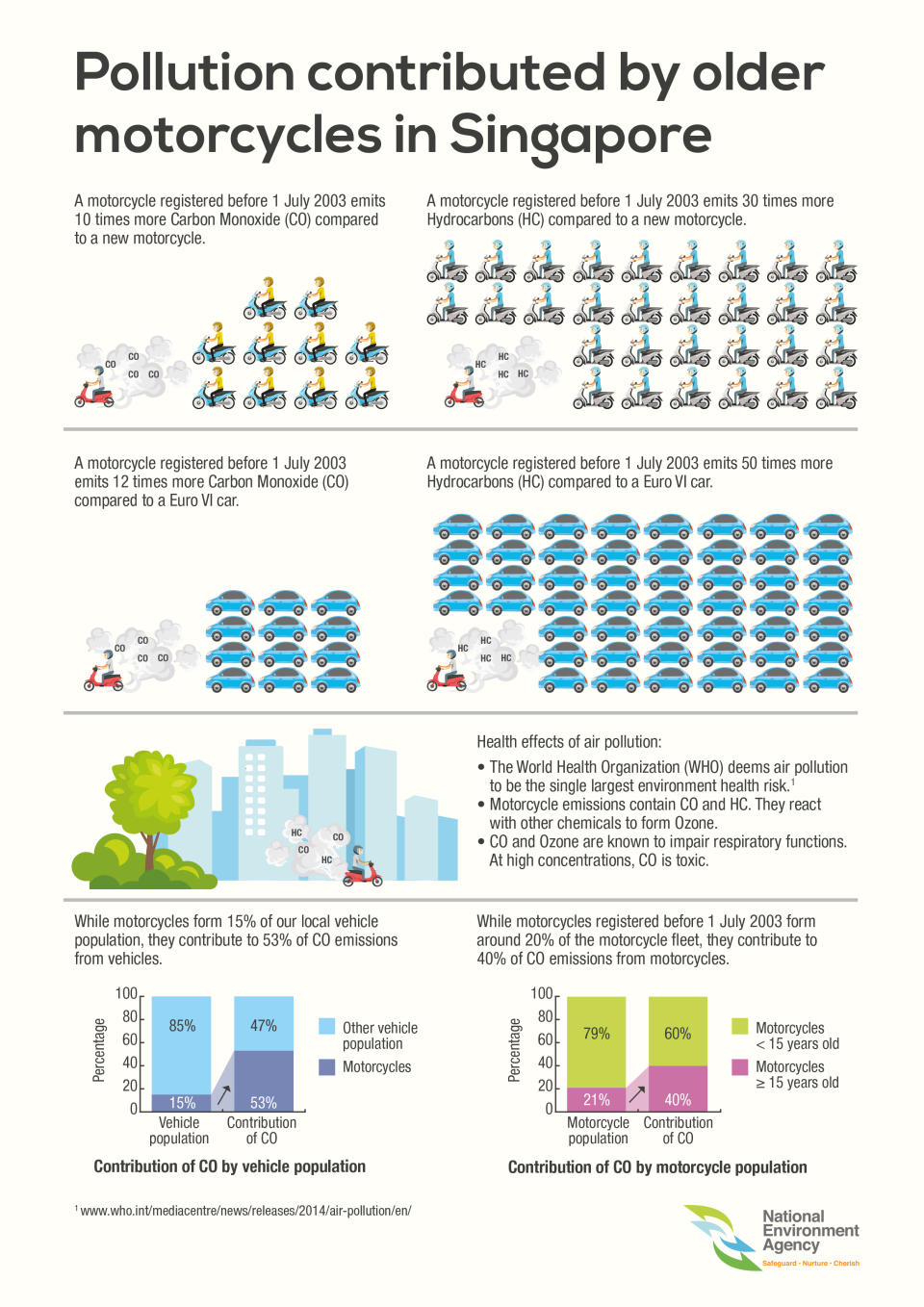NEA offers $3,500 incentive to de-register older motorcycles over next five years

In a bid to tackle air pollution, owners of motorcycles registered before 1 July 2003 will get a cash incentive of up to $3,500 if they de-register them over the next five years.
Owners are eligible for the two-part incentive if their motorcycles have a valid 10-year Certificate of Entitlement (COE) as of Friday (6 April), said the National Environment Agency (NEA) at a press briefing.
Owners of motorcycles which are on a five-year non-renewable COE or the Classic, Vintage (Restricted), and Revised Vintage Vehicle Schemes as of Friday are not eligible.
To qualify for an incentive of $2,000, eligible owners must de-register their motorcycles on or before 5 April 2023. They will receive an additional $1,500 if they do not renew their motorcycles’ COE after Friday, as well as a prorated rebate for their unused COE.
Following de-registration, the motorcycles will either be scrapped or exported to other countries.
Motorcycle owners will receive a letter from the NEA by end-April informing them of their eligibility for the incentive.
While motorcycles make up only 15 per cent of the local vehicle population, they contribute around 53 per cent of carbon monoxide emitted from vehicles, said the NEA.
In addition, older motorcycles registered before 1 July, 2003, emit up to 10 times more carbon monoxide – and 30 times more hydrocarbons – than a Euro IV motorcycle, and account for about 40 per cent of carbon monoxide emitted by the motorcycle fleet in Singapore. These pollutants are known to impair respiratory functions.
Some 27,000 motorcycles – about 21 per cent of the motorcycle fleet in Singapore – that are eligible for the incentive average about 20 years old.
In comparison, only one per cent of over 612,000 cars in Singapore are 15 years old and above. As such, there will not be a similar incentive scheme for older cars.
The NEA added that it is also looking into measures to reduce pollution from foreign motorcycles. Currently, all foreign vehicles are checked for excessive smoke emissions at Tuas and Woodlands checkpoints. About 48,000 foreign motorcycles – out of 62,000 foreign vehicles – entered Singapore daily last year.
Norman Lee, General Secretary of the Singapore Motor Cycle Trade Association, told Yahoo News Singapore that the incentive “will be a hit or miss, given the current price of motorcycles and the high COE, which hovers at around $8,000”.
“Until the NEA will put stricter requirements for in-use motorcycles in time to come and owners get penalised for that, then will they consider whether the $3,500 rebate is worthy,” Lee said.
He added that Singapore’s traffic model should be taken into consideration without assuming that all vehicles clock the same amount of time.
“A four-wheeler will have to spend five minutes (each on) parking a car and exiting the car park,” said Lee. “That’s 10 minutes of static pollution. Given the traffic context in peak-hour Singapore…a two-wheeler will only need one minute to park.”
From 6 April 2023, the NEA will also be tightening in-use emission standards for motorcycles registered before 1 July 2003, with more details to be released in due course. These motorcycles will be banned from roads in Singapore after 30 June 2028.
Motorcycles from the Classic, Vintage (Restricted), and Revised Vintage Vehicle Schemes are exempted from the new emission standards.

Minister for the Environment and Water Resources Masagos Zulkifli told reporters on the sidelines of the briefing on Friday that the NEA initiatives are part of the government’s long-term plan to ensure healthy air quality in Singapore.
“Over the years, we have been trying to reduce the number of older vehicles (from lorries to other heavy vehicles) on the road to ensure that our air quality is healthy,” said Masagos. “These and all the other initiatives – including tightening of industrial emissions – are all tied up to meet our WHO (World Health Organisation) standards for 2020.”

(SOURCE: NEA)

Other Singapore stories:
Scoot flight to Hat Yai turned around following alleged bomb threat by passenger
Singapore teen who hacked US National Football League Twitter account gets 24 months’ probation


